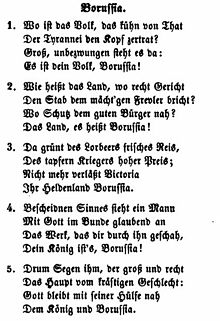Borussia (song)
The hymn Borussia , also known as Chant national prussien , was a patriotic Prussian song that temporarily held the status of a national anthem. The melody comes from Gaspare Luigi Pacifico Spontini , the text from Johann Friedrich Leopold Duncker . The term Borussia is a neo-Latin term for Prussia and a female figure as an allegory of Prussia.
history
In 1814 King Friedrich met Wilhelm III. in Paris the Italian composer Gasparo Luigi Pacifico Spontini, whom he brought to Berlin in 1820 as general music director . One of Spontini's first works in Berlin was the composition entitled Borussia. Prussian folk song . He had already composed it two years earlier as Chant national prussien . He has now orchestrated it for 100 violins , 50 trumpets , twenty other wind instruments (including bassoon , clarinet , horn ) and 130 voices plus soprano solo. The text was written by Johann Friedrich Leopold Duncker, the King's Cabinet Secretary.
On August 3, 1820, on the occasion of the birthday of King Friedrich Wilhelm III., Borussia was performed in the Royal Opera in Berlin . In the same year it was decreed as the Prussian national anthem and from then on sung in all schools and at patriotic festivities.
The hymn was later expanded by four stanzas, the author is believed to be Karl Alexander Herklots . However, these stanzas never became popular. It can only be found printed by August Heinrich Hoffmann von Fallersleben .
In the course of the establishment of the German Empire on January 18, 1871, attempts were made in August of the same year to revive Borussia with a changed text - instead of Borussia now Germania , instead of King now Kaiser - by means of a performance in the Royal Opera House , but without success.
text
1. Where are the people who, bold in action,
crushed tyranny?
It
stands there large, unbeaten:
|: It is your people, Borussia! : |
2. What is the name of the land where right judgment
breaks the rod of the mighty wicked one?
Where is protection close to the good citizen?
|: The country, it's called Borussia! : |
3. The fresh rice of the laurel is green,
The brave warrior's high price;
Victoria no longer leaves
|: Your hero country Borussia! : |
4. A man
with a modest mind stands believing in league with God.
The work that happened to you through him
|: It's your king, Borussia! : |
5. So blessings to him, who is great and right,
The head of the strong generation:
God stays close with his help
|: The king and Borussia! : |
literature
- Emil Bohn: The national anthems of the European peoples. In: 4th issue of the series Word and Custom. Folklore work called the Silesian Folklore Society. Published in informal notebooks by Dr. Theodor Siebs, ord. Professor at the University of Wroclaw and Dr. Max Hippe, city librarian in Breslau. Published by M. & H. Marcus, Breslau 1908.
- Franz Magnus Böhme (Hrsg.): Popular songs of the Germans in the 18th and 19th centuries brought together verbatim from old prints and manuscripts, as well as from vernacular. Breitkopf and Härtel, Leipzig 1895.
Web links
- Borussia : Sheet music and audio files in the International Music Score Library Project
- Great victory and festival march by Wilhelm Wieprecht with the song Borrussia
credentials
- ↑ Carl Freiherr von Ledebur: Tonkünstler-Lexicon Berlin's from the oldest times to the present. Ludwig Rauh, Berlin 1861, p. 570.
- ^ Karl Goedeke , Edmund Goetze: Outline of the history of German poetry from the sources. 2nd Edition. Ehlermann, Leipzig 1900, vol. 7, p. 853 .
- ^ August Heinrich Hoffmann von Fallersleben: Findlinge. Breitkopf and Härtel, Leipzig 1860.
